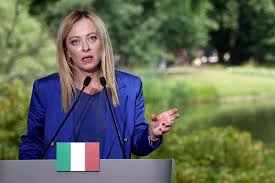Italy: Meloni defends windfall tax move against banks

Rome: Italy’s prime minister, Giorgia Meloni, has doubled down on a shock decision to introduce a 40% windfall tax on banks, saying she would “do it again” despite having sent lenders’ shares plunging last week.
The leader of the rightwing Brothers of Italy party told Italian newspapers on Monday that implementing the tax was the right decision for her government, which is the latest to target banks accused of profiteering at a time of high interest rates.
“I would do it again. Because I believe that the right things must be done … This is a decision that I took [alone]”, Meloni told the Italian newspaper La Repubblica. “It’s a sensitive issue and I take full responsibility for it.”
Italy is not alone in targeting banks with a windfall tax: similar decisions have been taken by the Czech Republic, Lithuania and Spain in recent months. Their aim is to target bank profits, which have soared in recent quarters as rising interest rates have allowed banks to charge borrowers more for loans and mortgages while most have failed to raise savings rates at a similar pace.
Italy’s attempt to take a slice of those profits spooked investors and sent shares in local lenders including Intesa Sanpaolo plunging last Monday. The reaction forced the government to water down elements of its scheme less than 24 hours after it was announced, saying it would cap taxes at 0.1% of banks’ assets, compared with analysts’ initial estimates of 0.5%.
The financial services firm Jefferies said the windfall tax would limit collective payouts from some of Italy’s largest listed banks, which account for about 50% of Italian deposits, to about €2.5bn (£2.2bn), instead of earlier estimates of up to €4.9bn.
Campaigners and some backbench MPs in Westminster have called for similar taxes in the UK, where banks are still facing criticism for failing to pass on interest rate rises to savers.
Positive Money, a campaign group, said replicating Meloni’s windfall tax could result in £3.4bn being raised for UK taxpayers from the big four banks – Lloyds, NatWest, Barclays and HSBC’s UK operations – based on profits earned in the first half of 2023 alone. Following in the Czech government’s footsteps by introducing a 60% tax on bank profits exceeding 120% of their average between 2018 and 2021 – could raise nearly £11bn, the group estimated.
Geoff Yu, a UBS strategist, said any government considering new taxes on banks should learn from Italy’s mistakes. “What Italy unveiled last week is perhaps a good example of how not to proceed. The last-minute windfall tax … was very poorly communicated to markets and comes amid the end of the widening phase for net interest margins in the European banking sector,” Yu said.





